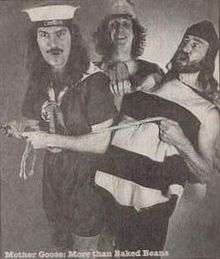Mother Goose (band)
| Mother Goose | |
|---|---|
 | |
| Background information | |
| Origin | Dunedin, New Zealand |
| Genres | Rock |
| Years active | 1975–1984, 2007 |
| Labels | Mushroom Records |
| Past members |
Craig Johnston Justin McCarthy Marcel Rodeka Pete Dickson Kevin Collings Steve Young Denis Gibbins Neil(Noah)Shilkin |
Mother Goose was a 1970s New Zealand band formed in Dunedin, in 1975.
Only eighteen months after forming, Mother Goose had smashed attendance records for gigs in every city in Australia and New Zealand (many of these house records still stand today). Stuffed, their debut album became Mushroom Records fastest selling album, and "Baked Beans" was a hit single across Australia; and their self-directed film clip for "Baked Beans" was so popular it was played on television stations between prime time programmes (in addition to dominating every Aussie TV rock show).
History
In late 1975, six Dunedin musicians wanted to play rock music, but came up with a name they considered low-brow, Mother Goose, and one of their trademarks was dressing in ludicrous attire.
Moving across the Tasman Sea
After a successful concert in Albert Park, Auckland, Mother Goose decided to move to Australia and started playing at Cloudland in Brisbane and at the Playroom on the Gold Coast, Queensland in late 1976. Their promoter, Ivan Dayman, contacted top Australian manager, Garry Spry, who flew up from Melbourne to see them and agreed to become their manager. He showcased the band at his Babes nightclub, and Mushroom Records offered them a recording contract, and their debut album, Stuffed, was released in 1977.
Bands such as Cold Chisel, Men at Work, The Angels, Midnight Oil, all started by opening for Mother Goose. In 1977, Mother Goose embarked on their first national tour with Supercharge.
United States
By June 1978, Mother Goose had moved to the United States and were living in Hollywood, California, with their own recording studio and signed to Scotti Brothers Records. However after five months of songwriting and recording demos, they left the Scotti Brothers and moved to New York. There they signed with the entertainment agents, Mecca Artists, and with help of Sid Bernstein they started playing residencies at The Other End, Trax and The Great Gildersleeves. Contractual battles with the Scotti Brothers, coupled with Mother Goose’s refusal to conform prevented the band securing another major recording contract. Lead guitarist Peter Dickson left the band in February 1979, and returned to Australia and was replaced by the New York–based guitarist, Justin McCarthy. He remained with the band until they broke up in 1984.
Late career
The band returned to Australia in 1979 after almost twelve months in the United States and undertook their 'Catch Me If You Can Tour'. They recorded two more albums, Don't Believe In Fairytales (1979) and This is the Life (1982). Mother Goose continued touring Australia and Canada until they broke up in 1984. Johnston and Rodeka joined The Incredible Penguins in 1985, which recorded a cover of "Happy Xmas (War Is Over)", a charity project with numerous guest musicians for research on little penguins, which peaked at #10 on the Australian Kent Music Report in December.[1][2]
Mother Goose reformed on 23 March 2007 as part of a 30 year celebration of the Dunedin Sound. The concert was called Re:Sound. The other main acts were; The Chills, Sneaky Feelings, and The Clean.
Members
- Craig Johnston (vocals)
- Marcel Rodeka (drums)
- Pete Dickson (lead guitar)
- Kevin Collings (rhythm guitar)
- Steve Young (keyboards)
- Denis Gibbins (bass guitar)
- Justin McCarthy (lead guitar) - replaced Dickson in 1979
- Neil Shilkin (Noah Shilkin) (keyboards) - replaced Young in 1981
Discography
| Release date | Title | Label | Chart position |
Country | Catalog number |
|---|---|---|---|---|---|
| 1977 | Stuffed | Mushroom Records | 23 | Australia | |
| 1979 | Don't Believe In Fairytales | 62 | Australia | ||
| 1980 | "I Can't Sing Very Well" (single) | - | |||
| 1982 | This Is the Life | - |
References
- ↑ Kent, David (1993). Australian Chart Book 1970–1992. St Ives, NSW: Australian Chart Book Ltd. ISBN 0-646-11917-6. Note: Used for Australian Singles and Albums charting from 1974 until ARIA created their own charts in mid-1988. In 1992, Kent back calculated chart positions for 1970–1974.
- ↑ Spencer, Chris; Zbig Nowara; Paul McHenry (2002) [1987]. "Incredible Penguins". The Who's Who of Australian Rock. Noble Park, Vic.: Five Mile Press. ISBN 1-86503-891-1. Retrieved 2 January 2010. Note: [on-line] version established at White Room Electronic Publishing Pty Ltd in 2007 and was expanded from the 2002 edition.